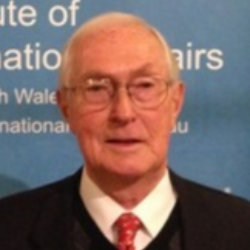GEOFF MILLER. Kim Jong Un - Forcing the pace, or forging a peace?
July 10, 2017
Kim Jong Uns continual provocation of the United States can probably be best explained as a considered strategy to bring about negotiations between the two.
Many Korean experts, Dr Leonid Petrov of the ANU, for example, are not at all surprised by North Koreas determination to acquire a nuclear deterrent against a possible United states attack or attempt at regime change. This is not a view unique to Korean scholars. In The Weekend Australian of 24-25 June, Greg Sheridan quoted James Clapper, former US Director of National Intelligence, as saying that during a visit to North Korea a couple of years ago he was struck by the degree of paranoia and the siege mentality among their officials. Theyre not going to denuclearise. Thats their only leverage.
So thats pretty clear. But in all the attention being given to North Korea because of its nuclear and missile tests one aspect has been a continual puzzle. If those tests are part of a program essentially designed to protect against a United States attack, why continually taunt and even threaten the United States as Kim does? On the one hand he talks of the recent ICBM test as a 4th of July present to the Americans, and on the other he publicly looks forward to the day when a North Korean nuclear-tipped missile can reach Los Angeles or San Francisco.
With the missile tests, and statements like the above, he has certainly got the United States, and even the worlds, attention. But its attention that focuses on counter-measures, increased sanctions, and even military strikes.
So why present the North Korean missile and nuclear programs to the world in this way? It would seem quite possible—though admittedly a stretch—to have maintained the same programs but to have presented them in a cloud of assurances of their purely defensive nature, never to be used to attack or coerce others, simply needing to keep up with evolving technology etc—in other words, to make the Obama Administrations policy of strategic patience seem still relevant, and for North Korea to get away with it, as India and Pakistan have done.
There are different possible answers to this question. After all, for decades North Korea has complained about feeling threatened, each year, by the US-South Korea joint military exercises on the peninsula. South Koreans are famously direct people, and there is no reason to think the North Koreans are different. They could have simply become more than usually fed up, and decided to indulge themselves by telling the Americans exactly where to get off.
But on consideration that seems a bit too flip, even for direct people, given that the issues involved include the survival of the regime, and even the possibility of a nuclear war. North Korea clearly sees the US as its main threat, and it must be considered unlikely that in dealing with that threat North Korean leaders would indulge themselves in repeated un-considered statements. After all, many Korean experts vie with each other in assuring their readers that Kim Jong Un is not crazy but rational.
So if hes rational, why is he doing what hes doing? I think the most likely explanation is that he is aiming to put the US in an intolerable position—being under the constant threat of having one of its cities destroyed at the whim of a crazy dictator—from which it can only escape by meeting North Koreas calls for direct negotiations, looking towards security guarantees and a peace treaty.
This strategy involves Kim and his regime making two big bets, first that the US will conclude that it does not have a viable military option against North Korea, to a considerable extent because of the consequences for South Korea; and secondly that the US and the international community will not be able to impose sanctions severe enough to bring the regime down, to a considerable extent because of the attitude and interests of China. They are bold bets, but it would be hard to make the case that they will fail. For instance, to quote James Clapper again, in his interview with Greg Sheridan, in my mind the US really has no pre-emptive military measures it can take.
So, if Kims bets are sound, the only way the US can free itself from an unpredictable but increasingly realistic nuclear threat is to agree to what North Korea has sought for decades, direct negotiations. That would mean the US giving way on its two main objections to such talks—first, that they would mean rewarding bad behaviour, and secondly that they would diminish the role and status of South Korea (which under its new President is putting itself forward as the most appropriate interlocutor in dealing with the North).
But on the other hand many observers of the Korean situation have for years recommended direct negotiations between the US and North Korea, as essential if the impasse on the peninsula is ever to be resolved. It may be that Kim Jong Uns high-risk tactics will in the end prove to have been an unlikely way of bringing them about.
Geoff Miller is a former Australian Ambassador to the Republic of Korea and Japan, and Director-General of the Office of national Assessments.
